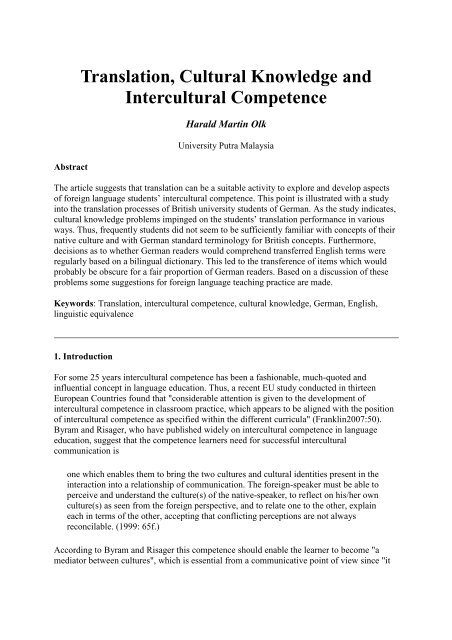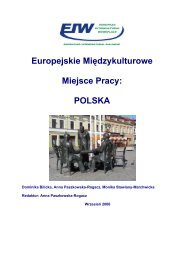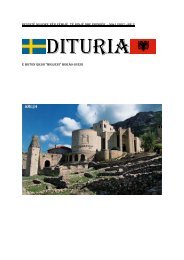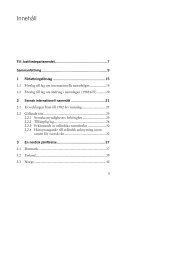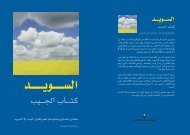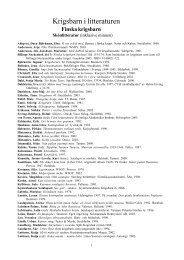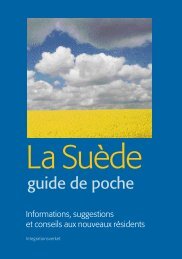Translation, Cultural Knowledge and Intercultural Competence
Translation, Cultural Knowledge and Intercultural Competence
Translation, Cultural Knowledge and Intercultural Competence
Create successful ePaper yourself
Turn your PDF publications into a flip-book with our unique Google optimized e-Paper software.
The source text to be translated had been adapted from a broadsheet newspaper article (seeappendix), <strong>and</strong> provided a good sample of British cultural references with subject areasranging from politics (e.g. "House of Lords", "Tory") through law (e.g. "QCs", "barrister"),education (e.g. "public school", "Oxbridge") <strong>and</strong> history (e.g. "Victorian") to geographicalterms (e.g. "Home Counties", "Kensington").As search of the Guardians’ online archives (available via http://www.guardian.co.uk)suggested, the items varied considerably in frequency of occurrence with more frequent CRsregistering in excess of 8000 hits ("house of lords" [8785], "solicitor" [8868], "Tory" [34266])while the least frequent items occurred below 1000 times ("inns of court" [108], "LordMayor" [693], all searches conducted 10.09.2008). The majority of items, however, occurredmore than 1000 times in the archives, suggesting that the CRs were commonly used <strong>and</strong> notobscure as a result of their "exotic" status in the source culture. Due to the focus of the articleon the upper <strong>and</strong> upper middle strata of British society, many CRs pertain to the respectivesocial levels. However, it was assumed that most of referents were sufficiently well-known tohave penetrated all social levels to some extent. For instance, the renowned department store"Harrods" was believed to be so famous that it would be known even to the majority ofpeople who would not consider patronising it.For the identification of cultural references the researcher relied essentially on the followingdefinition provided by Aixelá:Those textually actualized items whose function <strong>and</strong> connotations in a source textinvolve a translation problem in their transference to a target text, whenever theproblem is a product of the nonexistence of the referred item or of its differentintertextual status in the cultural system of the readers of the target text. (1996: 58;italics in the original)The study made use of the introspective research method of thinking aloud, since it hasproved to be a valuable tool to get at least some access to the thought processes contributingto translation products (cf. Jääskeläinen (2002) for an overview of think-aloud studies into thetranslation process). Even though verbal protocol data can <strong>and</strong> often will be incomplete in thatthoughts may not be reported for various reasons, the procedure gave significant insights intohow the students approached the translation of the cultural references, which would haveremained undetected in a purely product-based analysis. As the study was interested in thetranslation procedures the students would consider best rather than those they would adoptdue to a lack of lexical or cultural knowledge, they were provided with several dictionaries, ofwhich an unabridged Collins bilingual dictionary <strong>and</strong> a dictionary of British culture wereconsulted most frequently.In the following sections, some findings of the study will now be presented which appearedrelated in that they all reflected cultural knowledge problems of some sort.3. Findings3.1. Lack of source-culture knowledgeAs the text was fraught with cultural references, source-culture knowledge, i.e. knowledgeabout the British concepts in the source text, clearly played an important role in the students’translation process. Two different types of source-culture knowledge problems were
distinguished. The first category comprises all instances where students had a comprehensionproblem of which they were aware ("overt source-culture knowledge problem"). The secondgroup contains all CR translations where students already had or arrived at a wrong meaninghypothesis, but did not appear to be aware of it ("covert source-culture knowledge problem").The knowledge problems were identified on the basis of the following criteria:An overt source-culture knowledge problem was assumed to have been involved inthe translation of a CR, if at least one of the following occurred:• a student states at any point of the process that s/he is uncertain about themeaning of the CR or any aspect of its meaning relevant to its translation; astudent reports any such problem during the retrospection;• a student uses the dictionary of British culture 1 in order to establish orconfirm a meaning hypothesis;• a student states a wrong meaning hypothesis, which is later in the processcorrected;A covert source-culture knowledge problem was assumed to have been involved ina CR translation, if at least one of the following occurred:• a student forms a wrong meaning hypothesis during the thinking aloud,which is not corrected or reveals a wrong meaning hypothesis during theretrospection;• a student’s written translation shows a clear misunderst<strong>and</strong>ing of the CR,even though no comprehension problem was reported;Surprisingly, roughly one fifth of the cultural references in the text caused overt or covertcomprehension problems for the British students, which means that on average the translationof six CRs involved a source-culture knowledge problem. For instance, 26% of the studentswere uncertain about the meaning of "Oxbridge" or misinterpreted the item. This figure risesto 47% for the CR "Whitehall", to 63% in the case of "City of London" <strong>and</strong> to more than 70%for "QCs" <strong>and</strong> "Inns of Court". The items that caused most comprehension problems were"Clubl<strong>and</strong>" <strong>and</strong> "Corporation" (both 84%). While the students were not expected to alwayshave a clear idea about relatively complex concepts such as "the Inns of Court", it wasastonishing to regularly detect complete lack of knowledge. For instance, in the case of "Innsof Court" most of the students who had comprehension problems appeared to have comeacross the term for the first time. Student B 8 declared that she had "never heard of them[her]self", as did participants B 15 <strong>and</strong> B 14 . Others reported that they had no idea what the termreferred to, indicating the absence of even a vague concept. This complete absence ofknowledge did not only occur for relatively rare <strong>and</strong> complex expressions, but also for itemswhich were believed to be more well-known. Student B 17 reported that she had never comeacross the term "Home Counties" before, <strong>and</strong> three other students stated frankly that they didnot know what "it" was. Similarly, students B 19 <strong>and</strong> B 17 said that they did not know the term"Whitehall" while participant B 15 remembered the process thus:first of all it made me think of White House <strong>and</strong> that’s obviously America... <strong>and</strong> then[after looking up "Whitehall" in Collins] I don’t think anyone in Engl<strong>and</strong> really refersto the British government as Whitehall... I don’t know if we really say that
Even though the above are only examples <strong>and</strong> cannot be used as a basis for generalisationabout the students’ knowledge of their native culture, they suggest that insufficient familiarityof native-culture concepts can be a significant problem in translation. As one has to bear inmind, the CRs in the given text were not selected for their complexity or obscurity, butoccurred "naturally" in an authentic, non-specialised article in a broadsheet paper. The degreeof miscomprehension or simple lack of underst<strong>and</strong>ing by graduate or near-graduate nativespeakers was therefore rather unexpected.An interesting group of comprehension problems were those instances where studentsbelieved they had understood a cultural reference whereas in fact their translation was basedon a wrong meaning hypothesis (covert source-culture knowledge problems). For instance,the term "Clubl<strong>and</strong>" posed problems, which were rooted in the ambivalence of the word"club" in its traditional sense referring to exclusive gentlemen’s clubs <strong>and</strong> its more recentmeaning denoting a night-club. Apparently misled by the latter meaning eight of the students(42%) believed that the term "Clubl<strong>and</strong>" in the source text referred to an area bustling withnightlife. This misinterpretation occurred even though several of the students consulted thedictionary of British culture, which defined "Clubl<strong>and</strong>" as an area with many clubs. Clearly,the students believed they had understood the meaning of "club" <strong>and</strong>, consequently, did notcheck the cross-referenced entry of "club" directly above "Clubl<strong>and</strong>", which would haveclarified its intended meaning. Significantly, the fact that students had misinterpreted the CRwas not always obvious from their written translations. In fact, only one third of the writtentranslations made the misunderst<strong>and</strong>ing obvious (e.g. "‘Clubl<strong>and</strong>’, das berühmte Disco GebietLondons" [Clubl<strong>and</strong>, London’s famous nightlife district]). In the other cases students usedtranslations such as "Klubviertel" [club quarter], as suggested by the bilingual dictionary, orsimply transferred "Clubl<strong>and</strong>", which would have made it impossible for a marker to identifythe comprehension problem. This underlines the importance of the think-aloud <strong>and</strong>retrospective data, without which the wrong meaning hypothesis of the students would nothave been detected. The item "City of London" posed a similar problem with six studentsbelieving that "City of London" referred to the city as a whole, which led to mistranslationssuch as "die Hauptstadt London" (the capital London) or "die Stadt London" (the city ofLondon).What is remarkable about these misinterpretations is the fact that the students on almost nooccasion seemed to be concerned about the fact that the assumed meaning made little sense inthe given text. Thus, none of the students seemed to notice the obvious clash between thephrase "solid base in tradition" <strong>and</strong> the relatively modern activity of "clubbing". Similarly,none of the students misinterpreting "City of London" appeared to wonder what theconnection was between "tradition", "institutions" <strong>and</strong> London as a whole. This seems toindicate that context only played a limited role in the comprehension <strong>and</strong> translation processof the students. Apparently, the students approached CRs not so much as a part of a text, butas isolated language items, which were dealt with on an individual basis.3.2. Target-culture knowledge problemsCompared to the frequent <strong>and</strong> grave problems caused by lack of source-culture knowledge,comments indicating target-culture knowledge problems were rare: only fifteen remarkssuggested that students had an overt target-culture knowledge problem. In these commentsclarification was mainly sought in relation to legal terms with students attempting to delineatethe German concept of "Rechtsanwalt" (lawyer) as opposed to that of "solicitor" or"barrister". The fact that comments referring to lack of target-culture knowledge were rare
was assumed to be mainly related to the nature of the text <strong>and</strong> the task. Since the text dealtwith the students’ native culture <strong>and</strong> the translation brief did not call for extreme shiftstowards the target culture (e.g. by requiring the substitution of British CRs with target-cultureequivalents), the students appeared to mainly operate within a source-culture framework orthe common ground occupied by both cultures.While overt target-culture knowledge problems seemed rare, the phrase "old professions"seemed to cause covert target-culture knowledge problems in 13 instances (68%), becausestudents did not appear to be aware of the culture-specific differences between the Germanterm "Berufe" <strong>and</strong> "the professions". In the case of "old professions" the translation problemhas two culture-specific facets, one of which stems from different lexical segmentation inGerman <strong>and</strong> English. The st<strong>and</strong>ard translation for "profession" given in bilingual dictionariesis usually the term "Beruf", which is more comprehensive than the English expression <strong>and</strong>includes any kind of occupation which requires training, regardless of status <strong>and</strong> type ofqualification. German, however, lacks a single word denoting occupations of a higher status.The second aspect of culture specificity are the connotations of "old professions" in the giventext, which are deeply rooted in British society <strong>and</strong> therefore difficult to convey in German.Thus, the term "old professions" in English is linked closely with the well-educated middleclasses <strong>and</strong> an old-established social hierarchy, which is not captured by the connotativelyneutral "Beruf".Most of the students, however, put "alte Berufe" either in a form of automatic substitution orafter consulting the bilingual dictionary. In the interviews subsequent to the think-aloudtranslation all but one student who had put "alte Berufe" gave the impression that theyassumed there to be full equivalence between "Berufe" <strong>and</strong> "professions". Unfortunately, thetranslation "alte Berufe" appears somewhat awkward in the given context since the Germanphrase seems more likely to refer to old trades such as cobblers, bakers or saddlers thantraditional academic professions. Thus, search of the online corpus of the German LanguageInstitute (IDS) in Mannheim (available at http:// cosmas2.ids-mannheim.de/cosmas2-web/)suggests strongly that "alte Berufe" would not be associated with traditional academicprofessions by German readers. The corpus contains more than three billion running words<strong>and</strong> comprises various newspapers <strong>and</strong> magazines in the German language. The item "alteBerufe" registers more than thirty hits, none of which refer to academic professions.Typically, excerpts found in the corpus focus on old trades which have all but died out: "alteBerufe wie Schmied und Schleiferei" [old trades such as blacksmiths <strong>and</strong> grinders] or "alteBerufe wie Wagner, Sattler, Hufschmied" [old trades such as wainwright, saddler, farrier].This suggests that the students’ rendering could easily evoke inappropriate connotations inGerman readers.3.3. Insufficient knowledge of German terminology for British conceptsAs pointed out by Newmark (1988), certain referent types such as well-known politicalinstitutions, book <strong>and</strong> film titles, or geographical terms tend to have st<strong>and</strong>ardised translationsin other languages. Thus, normally "Kanzlerin Angela Merkel" will be rendered in English as"the (German) Chancellor Angela Merkel" <strong>and</strong> the German state "Nordrhein-Westfalen" as"North Rhine-Westphalia".In the given text a number of CRs had translations which could be considered as st<strong>and</strong>ardtranslations. Overall, these st<strong>and</strong>ard solutions seemed to be little known by the students, asfrequent use of the bilingual dictionary for these items suggests. While it was unsurprising
that none of the students appeared to know a relatively uncommon term like "Kronanwalt"[*crown lawyer] for "QC", the apparent lack of target-language terminology for morefrequent source-culture terms was unexpected. Thus, fourteen students (74%) had to look upthe st<strong>and</strong>ard translation for "Victorian" (viktorianisch), only one of the students (5%) seemedto actively know the st<strong>and</strong>ard translation for "House of Lords" (britisches Oberhaus) <strong>and</strong> noneseemed to be aware of the German translation for "county" (Grafschaft). Some of the studentsalso seemed to have no passive knowledge of the terms, since they expressed uncertaintyabout the correctness of the st<strong>and</strong>ard expressions provided by the bilingual dictionary. Forinstance, student B 1 looked up "House of Lords", saying she hoped the provided solutionwould "ring a bell", but then frankly admitted that she had never heard the term "Oberhaus"(upper house) before.Geographical terms also caused problems with eight students looking up "Wales", unawarethat the term is usually transferred unaltered into German. Most strikingly, the students alsodisplayed insufficient knowledge of target-language terminology with regard to the item"Britain": three of the students chose to look up "Britain" in the bilingual dictionary, becausethey could not think of a suitable rendering; one of these students selected the potentiallyproblematic solution "Britannien", ignoring information in the dictionary that the term hasbecome dated; students B 9 <strong>and</strong> B 19 simply transferred "Britain", stating in the retrospectionthat this procedure had been automatic <strong>and</strong> that they had not been thinking anything inparticular; finally, more than 60% of the students, who used the German st<strong>and</strong>ard translation"Großbritannien", spelled it incorrectly as "Groß Britanien", "Großbrittanien","Großbritanien" or "Grossbritanien".While it is impossible to deduce from such a small sample of CRs with st<strong>and</strong>ard translationsthe extent to which the students were familiar with st<strong>and</strong>ard terminology, the fact that manystudents did not seem to know relatively common terms indicates that there may have beenlittle awareness of German st<strong>and</strong>ard terminology for British concepts.3.4. Consideration of readership’s source-culture knowledgeAs expected, students seemed to have difficulties assessing the extent to which individualCRs would be known by German readers. As the think-aloud data suggests, decisions as towhether a CR can be transferred into the German target text appeared to be based on twomain strategies. Less frequently, the decision seemed to be derived from the students’personal experience in German-speaking countries, as in the following examples:High life... got to be in there [looks up "high life" in Collins]... oh, joy... it is... oh, butit’s in English... [laughs]... I don’t know about leaving that in English there... I’venever heard that... I don’t think I’ve heard that in Germany[looks up "barrister" in Collins]... I’m not gonna put "Barrister"... although that’sdown here... I haven’t actually heard that used in GermanMuch more frequently, however, decisions as to whether a CR would be understood <strong>and</strong>accepted by German readers appeared to be based on the solutions provided by the bilingualdictionary. On ninety-one occasions students transferred CRs without explanation because theprocedure had been suggested in the dictionary. Thirty-six of these instances wereaccompanied by comments indicating that students assumed transferred CRs in the bilingualdictionary would be known in Germany, as in the following examples:
[retrospection, student B 1 ] the first word, it was "Whitehall" in the thingy [bilingualdictionary]... I don’t go by first words, I often look through, but if I’m not sure of it<strong>and</strong> it does say "Whitehall" or it does say that word first without any... muchexplanation in between, it implies that they know[think aloud, student B 7 ] [looks up "peer" in Collins] "Peer"... for "peer" they put thesame thing... so actually that means that Germans know what it isThirteen other students seemed to agree with student B 7 above <strong>and</strong> also transferred "peer" intotheir German target texts as suggested in the bilingual dictionary. The assumption that theitem would probably be known in Germany, however, is not supported by corpus analysis.Thus, analysis of the IDS corpus of the German newspaper Frankfurter Rundschau (years1997-99), which addresses an educated readership similar to Der Spiegel, registers 16 hits forthe item "peers", referring to members of the British upper house. In basically all instancesthe item is unambiguously contextualised or explained as in the following example:Derzeit gehören dem House of Lords 635 "Hereditary Peers" (Erbadelige) und 505"Life Peers" ... anCurrently, the House of Lords comprises 635 "hereditary peers" (hereditary titles)<strong>and</strong> 505 "life peers".In a similar vein, the online archive of the German newspaper Die Zeit (available at:http://www.zeit.de/archiv/index) reveals only a single hit for "peer" for the period 2000 to2007, in which the phrase "life peers" is succeeded by the explanatory phrase "Lords aufLebenszeit" [Lords for their lifetime]. As this suggests, the item "Peer" on its own in aGerman text may cause comprehension problems for at least some German readers.Reliance on the bilingual dictionary regularly seemed to lead students towards more exoticsolutions than they had originally intended. For instance, when translating the item "Tory"student B 8 first reflected: "best to write it in English <strong>and</strong> afterwards write ‘Tory’ –‘conservative’". Later, she transferred "Tory" into the text without clarification <strong>and</strong> reportedduring the retrospection she had done so "only because I looked it up in the dictionary <strong>and</strong> itsaid "Tory" – "Tory", that is the translation for it". Thus, dependency on the bilingualdictionary seems likely to have contributed to instances of transference, many of whichseemed potentially problematic on two grounds. First, the bilingual dictionary sometimessuggested the transference of CRs, which, even though they can of course theoretically betransferred, would probably be obscure to German readers unless unambiguouslycontextualised. Second, many transferred items seemed problematic because their relativelyexotic nature could give them undue communicative weight in a German text.For example, in the source text the item "barristers" appears in a sentence which provides anexample of the high number of top professionals working in London: "For instance, half totwo thirds of all solicitors <strong>and</strong> barristers in Engl<strong>and</strong> <strong>and</strong> Wales work in London [...]". In thesource text, this sentence primarily serves illustrative purposes. Any translation focusing aGerman reader’s attention on the foreign concept of barrister would therefore seeminappropriate. Nevertheless, two thirds of the students transferred the item, after finding"Barrister" in the dictionary alongside the German near-equivalent "Rechtsanwalt".
The above indicates that the students’ reliance on the bilingual dictionary contributed tosolutions, which probably would have been marked by undue communicative weight becauseof their "foreign-ness" <strong>and</strong> a degree of obscurity for a fair number of German readers. Thestudents showed a tendency to adopt ready-made dictionary solutions, but rarely appeared tobe critically aware that bilingual dictionaries can only suggest possible solutions, which –especially in the case of cultural references – may often not be appropriate.4. DiscussionThe students’ difficulties related to the translation of culture-specific lexis indicateproblematic aspects of the students’ intercultural competence. Even though the problemsoccurred in a translation task, it does not seem unlikely that similar problems could equallyaffect other communicative scenarios involving culture-bound lexis. The following sectionswill therefore make some suggestions as to how the individual problems could be approached<strong>and</strong> hence the students’ intercultural competence enhanced.4.1. Lack of source-culture knowledgePerhaps most surprisingly, the students seemed to lack familiarity with some of their nativeculture concepts <strong>and</strong>, consequently, had difficulty rendering them for German readers. As itseemed, at least some of the students did not partake in certain discourses within their culture<strong>and</strong> hence lacked familiarity with related concepts, which – especially from the perspective ofa cultural outsider (e.g. German) – belong to their national cultural inventory. The fact thatlanguage graduates due to their linguistic competence may be expected to mediate in contextsrequiring substantial knowledge of discourses, which are basically from within their nativeculture but nevertheless little known to them, is a problem, which cannot be solved within aforeign language program. Indeed, as Viaggio points out with reference to translationstudents, "the institution cannot hope to ‘teach’ all the knowledge of the world" (1992: 310).Similarly, Pisek (1997), who also observes that lack of cultural knowledge tends to constitutea translation problem for tertiary-level language students, argues convincingly that there areobvious limitations on what can be conveyed within a classroom setting.What language classes however can do, is raise students’ awareness that knowledge of theirown culture is always limited <strong>and</strong> that intercultural communication may require them to get amuch broader <strong>and</strong> deeper knowledge base of their own culture than they would normally needwithin their "domestic" discourses. Hence, language classes should aim to equip learners withthe skills needed to identify relevant reference sources about their own culture <strong>and</strong> to exploitthem adequately for communication in the foreign language.4.2. Insufficient knowledge of German source-culture terminologyAs reported, students often did not seem to be aware of st<strong>and</strong>ard source-culture terminologyin German with participants looking up terms as common as "House of Lords", "county","Wales", or even "Britain". A possible factor which may have contributed to this apparentunfamiliarity with common source-culture terminology in German was discovered when 103source texts were analysed which had been used in the students’ translation classes(participants in the study were asked to provide teaching material which had been used intheir translation classes). As a survey of these texts suggests, the vast majority of source textsfor translation both from <strong>and</strong> into German dealt with Germany or were located in Germanspeakingsettings.
Presumably, texts with "German content" were selected to provide the students withinformation about Germany <strong>and</strong> to familiarise them with a British perspective on Germanaffairs. The importance of these objectives cannot be called into question, but, as one needs tobe aware, a strong focus on the foreign culture also means that the students are only rarelyconfronted with their own culture in translation tasks. This could explain why many of theBritish participants in the study did not appear to be familiar with German st<strong>and</strong>ard terms forcommon British concepts. Considering that an important aspect of intercultural competence isthe ability to explain one’s own culture in terms of the other (cf. introduction), the use ofsource texts which deal with the students’ own rather than the foreign culture may bebeneficial.4.3. Consideration of readership’s source-culture knowledgeThe finding that the British students seemed to have difficulty assessing whether specific CRswould be known by German readers was not entirely unexpected: even German nativespeakers may in many cases be unsure about what a German audience can be expected tounderst<strong>and</strong>. What appears problematic about the students’ approach, however, is the almosttotal reliance on the bilingual dictionary to determine what German readers would probablyknow.Instruction therefore first of all needs to raise students’ awareness that the context-freesolutions for CRs in the bilingual dictionary cannot always readily be fitted into any targettext. Rather, students have to be encouraged to exercise extreme caution where transference issuggested in the bilingual dictionary <strong>and</strong> to assess carefully the necessity of introducingrelatively foreign items into their texts. Furthermore, where appropriate <strong>and</strong> available,students should also be encouraged to make use of online corpora in the foreign language,which can provide valuable examples as to how individual foreign items are usually dealtwith in the target culture.5. ConclusionThe study suggests that translation can be a useful tool to uncover deficiencies in students’intercultural competence. It can also be used to raise awareness of issues in interculturalcommunication <strong>and</strong> in this way enhance their competence. In the article some translationproblems related to cultural knowledge have been discussed, which illustrate that interculturalcompetence can depend just as much on knowledge about one’s native culture <strong>and</strong> how it islinguistically represented in the foreign language as it does on an underst<strong>and</strong>ing of the foreignculture. Therefore, language teachers need to anticipate that learners may not be sufficientlyfamiliar with cultural items belonging to their own wider cultural context to deal with themappropriately in tasks requiring mediation.AppendixText used in the think-aloud translationBritain’s new super classBritain has a new upper class: the "super class", a highly-paid elite, which is
uilt on old professions <strong>and</strong> institutions. Being British, they have a solid base intradition, whether in Oxbridge, Clubl<strong>and</strong>, the Inns of Court, the House of Lords,or the City of London with its medieval Corporation <strong>and</strong> Lord Mayor. On theother h<strong>and</strong>, the super class is a new phenomenon originating from the reformsthat were a product of Thatcherism in the 1980s. Like the Victorian factoryowners <strong>and</strong> hereditary peers, this class has come to believe in the justice of itswealth <strong>and</strong> status.The lives of the new class revolve around Harrods <strong>and</strong> Kensington; the bestpublic schools; modern art; the Royal Opera; <strong>and</strong> the high-life in London, wheremuch of the super class is concentrated. For instance, half to two thirds of allsolicitors <strong>and</strong> barristers in Engl<strong>and</strong> <strong>and</strong> Wales work in London, as do 85 percentof all QCs.This concentration in London has two main effects. First, most of the elite’seconomic weight is exerted at the heart of the nation, ensuring it strong cloutwith Whitehall - regardless of whether the government is Tory or New Labour.Secondly, it enables the super class to separate itself from most of the country.Britain beyond the Home Counties barely features on its horizon.ReferencesAixelá, J. F. (1996). Culture-specific items in translation. In: Álvarez, R.; África Vidal, M. C.,(eds.) <strong>Translation</strong>, Power, Subversion. Clevedon: Multilingual Matters, 52-78.Byram, M. <strong>and</strong> Risager, K. (1999). Language Teachers, Politics <strong>and</strong> Cultures. Clevedon:Multilingual Matters.Franklin, P. et al. (2007). The <strong>Intercultural</strong> <strong>Competence</strong>s Developed in Compulsory ForeignLanguage Education in the European Union. EAC/25/06 [available athttp://ec.europa.eu/education/policies/lang/doc/lace_en.pdf]Hofstede, G. (1980). Culture's consequences: international differences in work-related values,Beverly Hills, CA: Sage.Jääskeläinen, R. (2002). Think-aloud protocol studies into translation. An annotatedbibliography. Target 14 (1), 107-136.Mailhac, J.-P. (1996). Evaluation criteria for the translation of cultural references. In: Harris,G. T. (ed.) On Translating French Literature <strong>and</strong> Film. Amsterdam/Atlanta: Rodopi, 173-188.McSweeney, B. (2002). Hofstede’s Model of national cultural differences <strong>and</strong> theirconsequences: a triumph of faith – a failure of analysis. Human Relations, 55 (1), 89-118.Newmark, P. (1988). A Textbook of <strong>Translation</strong>. London: Prentice Hall.Pisek, G. (1997). Übersetzung im universitären Fremdsprachenunterricht: Probleme undMöglichkeiten. In: Stegu, M.; de Cillia, R. (eds.) Fremdsprachendidaktik undÜbersetzungswissenschaft. Frankfurt/Berlin: Peter Lang, 107-121.
Viaggio, S. (1992). Translators <strong>and</strong> interpreters: professionals or shoemakers?. In: Dollerup,C. <strong>and</strong> Loddegard, A. (eds.) Teaching <strong>Translation</strong> <strong>and</strong> Interpreting. Amsterdam: JohnBenjamins, 307-315.About the AuthorHarald Martin Olk has taught German as a foreign language <strong>and</strong> translation in Germany, theUK <strong>and</strong> Ghana. He is currently employed as a German lecturer at the Universiti PutraMalaysia in Malaysia.Author’s AddressDr. Harald OlkUnit B06-2, Istara CondominiumNo.1, Lorong Utara B, off Jalan Utara46200 Petaling Jaya, Malaysiae-mail: h.olk@web.deJournal of <strong>Intercultural</strong> Communication, ISSN 1404-1634, issue 20, May 2009.URL: http://www.immi.se/intercultural/.


